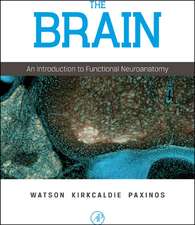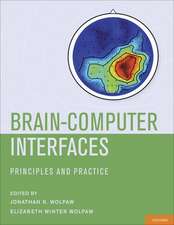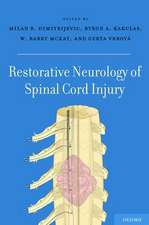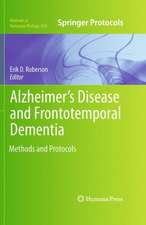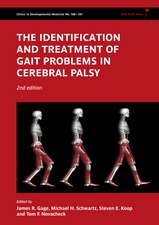Alzheimer’s Disease: A Physician’s Guide to Practical Management: Current Clinical Neurology
Editat de Ralph W. Richter, Brigitte Zoeller Richteren Limba Engleză Paperback – 24 mar 2013
Din seria Current Clinical Neurology
- 5%
 Preț: 601.59 lei
Preț: 601.59 lei - 5%
 Preț: 665.07 lei
Preț: 665.07 lei - 5%
 Preț: 1417.02 lei
Preț: 1417.02 lei - 5%
 Preț: 901.09 lei
Preț: 901.09 lei - 5%
 Preț: 971.05 lei
Preț: 971.05 lei - 5%
 Preț: 852.50 lei
Preț: 852.50 lei - 5%
 Preț: 736.03 lei
Preț: 736.03 lei - 5%
 Preț: 702.10 lei
Preț: 702.10 lei - 5%
 Preț: 1106.69 lei
Preț: 1106.69 lei - 5%
 Preț: 783.39 lei
Preț: 783.39 lei - 5%
 Preț: 722.84 lei
Preț: 722.84 lei - 5%
 Preț: 1611.40 lei
Preț: 1611.40 lei - 5%
 Preț: 1413.56 lei
Preț: 1413.56 lei - 5%
 Preț: 787.58 lei
Preț: 787.58 lei - 5%
 Preț: 778.80 lei
Preț: 778.80 lei - 5%
 Preț: 1829.91 lei
Preț: 1829.91 lei - 5%
 Preț: 779.16 lei
Preț: 779.16 lei - 5%
 Preț: 1949.70 lei
Preț: 1949.70 lei - 5%
 Preț: 782.83 lei
Preț: 782.83 lei - 5%
 Preț: 896.87 lei
Preț: 896.87 lei - 5%
 Preț: 917.53 lei
Preț: 917.53 lei - 5%
 Preț: 785.41 lei
Preț: 785.41 lei - 5%
 Preț: 716.09 lei
Preț: 716.09 lei - 5%
 Preț: 1172.17 lei
Preț: 1172.17 lei - 5%
 Preț: 1115.09 lei
Preț: 1115.09 lei - 5%
 Preț: 960.57 lei
Preț: 960.57 lei - 5%
 Preț: 721.40 lei
Preț: 721.40 lei - 5%
 Preț: 1095.73 lei
Preț: 1095.73 lei - 5%
 Preț: 1440.40 lei
Preț: 1440.40 lei - 5%
 Preț: 1110.32 lei
Preț: 1110.32 lei - 5%
 Preț: 788.14 lei
Preț: 788.14 lei - 5%
 Preț: 862.77 lei
Preț: 862.77 lei - 5%
 Preț: 1292.35 lei
Preț: 1292.35 lei - 5%
 Preț: 787.58 lei
Preț: 787.58 lei
Preț: 733.29 lei
Preț vechi: 771.89 lei
-5% Nou
Puncte Express: 1100
Preț estimativ în valută:
140.33€ • 152.38$ • 117.88£
140.33€ • 152.38$ • 117.88£
Carte tipărită la comandă
Livrare economică 22 aprilie-06 mai
Preluare comenzi: 021 569.72.76
Specificații
ISBN-13: 9781475744859
ISBN-10: 1475744854
Pagini: 496
Ilustrații: XIV, 479 p. 39 illus.
Dimensiuni: 178 x 254 x 26 mm
Greutate: 0.85 kg
Ediția:Softcover reprint of the original 1st ed. 2004
Editura: Humana Press Inc.
Colecția Humana
Seria Current Clinical Neurology
Locul publicării:Totowa, NJ, United States
ISBN-10: 1475744854
Pagini: 496
Ilustrații: XIV, 479 p. 39 illus.
Dimensiuni: 178 x 254 x 26 mm
Greutate: 0.85 kg
Ediția:Softcover reprint of the original 1st ed. 2004
Editura: Humana Press Inc.
Colecția Humana
Seria Current Clinical Neurology
Locul publicării:Totowa, NJ, United States
Public țintă
Professional/practitionerCuprins
1 Genetics of Alzheimer’s Disease and Related Disorders.- 2 Neuropathology of Alzheimer’s Disease.- 3 Oxidative Stress in the Development of Alzheimer’s Disease and Other Dementias.- 4 Metabolism and Alzheimer’s Disease.- 5 Alzheimer’s Disease: Epidemiological and Statistical Data.- 6 The Economic Burden of Alzheimer’s Disease and Dementia.- 7 Potential and Established Risk Factors for Alzheimer’s Disease.- 8 Medical Diagnosis and Workup of Alzheimer’s Disease.- 9 Neuroimaging Techniques: CT, MRI, SPECT, PET.- 10 Biological Markers in Alzheimer’s Disease.- 11 The Neuropsychology of Alzheimer’s Disease.- 12 Vascular Cognitive Impairment in Clinical Practice.- 13 Lewy Body Disease.- 14 Frontotemporal Lobe Dementia.- 15 Mild Forgetfulness: Distinguishing Early AD from Normal Aging.- 16 Mild Cognitive Impairment: What the Physician Should Know.- 17 Diagnosis of Predementia AD in a Clinical Setting.- 18 Loss of Olfactory Function in Patients With Alzheimer’s Disease.- 19 Treatment of Alzheimer’s Disease: Basic Considerations.- 20 Donepezil in Treatment of AD.- 21 Rivastigmine for Treatment of AD.- 22 Galantamine in Treatment of AD.- 23 Memantine in Treatment of AD.- 24 Alternative Treatment Options.- 25 Pain and Palliative Care in Late-Stage Dementia Patients.- 26 Cardiological Issues in Late-Stage Alzheimer’s Disease: A Clinician’s Approach.- 27 Neuroprotection and Neurodegenerative Disease.- 28 Neurotrophic Factors for Prevention of Alzheimer’s Disease.- 29 Statins in Prevention and Treatment of Alzheimer’s Disease.- 30 Potential Role of Androgens and Androgen Receptors in Alzheimer’s Disease.- 31 Role of Nutrition in Prevention or Delay of Alzheimer’s Disease.- 32 Impact of Physical Activity on Prevention of Alzheimer’s Disease.- 33Stem Cell Therapy for Alzheimer’s Disease.- 34 Secretases as Potential Targets for Treatment of Alzheimer’s Disease.- 35 AMPA Potentiation as a Treatment Option for Alzheimer’s Disease.- 36 Glycosaminoglycans as Potential Future Treatment of Alzheimer’s Disease.- 37 Implications of Research for Management of AD.- 38 Rating Scales and Outcome Variables Used in Clinical Trials.- 39 Gender Differences in Behavior of AD Patients.- 40 Management of Emotional and Behavioral Symptoms in AD.- 41 Assessment and Treatment of Neuropsychiatric Symptoms in Alzheimer’s Disease.- 42 Neuropsychiatric Symptoms in African American Dementia Patients.- 43 Resource Utilization by African American Dementia Patients.- 44 Apathy in Alzheimer’s Disease: Relationship to Executive Function.- 45 Are Alzheimer’s Patients Aware of Their Deficits?.- 46 Diagnostic Family Conference in AD: Issues and Recommendations.- 47 Care, Caregiver Issues, and Communication With the Demented Patient.- 48 Dental Care of AD Patients.- 49 Long-Term Medical Care Issues.- 50 Loneliness and Depression in Caregivers.- 51 Frequently Asked Questions About Alzheimer’s Disease.
Recenzii
"This is an easy-to-read and accessible book that presents an impressive amount of detail and information. It will appeal to physicians who want more background and detail as they approach their Alzheimer's patients, rather than just a simple "cookbook" recipe for treatment. Chapters on new and evolving treatments are well done and offer a glimpse of the future. Physicians who establish specialized clinics or units for the care of Alzheimer's patients will find this book especially useful."-Doody's Health Sciences Book Review Journal
"...chapters on pathophysiology lucidly explain the evidence supporting the role of oxidative stress, as well as the roles and interrelationships of mutant amyloid precursor protein, presenilin, and tau...The section on clinical assessment provides many clinical pearls that can help the clinician recognize dementias often mistaken for Alzheimer disease." - Annals of Internal Medicine
"...a mine of useful information that gives an honest cross-sectional view of our knowledge about dementia." - Institute for Ageing and Health
"...chapters on pathophysiology lucidly explain the evidence supporting the role of oxidative stress, as well as the roles and interrelationships of mutant amyloid precursor protein, presenilin, and tau...The section on clinical assessment provides many clinical pearls that can help the clinician recognize dementias often mistaken for Alzheimer disease." - Annals of Internal Medicine
"...a mine of useful information that gives an honest cross-sectional view of our knowledge about dementia." - Institute for Ageing and Health
Textul de pe ultima copertă
Alzheimer's disease (AD) is not only affecting increasingly large numbers of elderly and even middle-aged people in a worldwide epidemic, but also appears to be under-diagnosed and under-treated. In Alzheimer's Disease: A Physician's Guide to Practical Management, clinicians, scientists, and opinion leaders from all over the world provide a concise practical guide to the evaluation, assessment, and treatment of individuals with probable AD, illuminating the basic biology underlying the disease and outlining the many emerging therapeutic as well as promising preventive directions. On the clinical side, the authors focus on such issues as early changes and preclinical conditions-including mild cognitive impairment and predementia AD-how the patient presents, the state-of-the-art therapy, and the recent neuropsychiatric aspects of AD. Late-life issues are discussed, as well as the treatment of frequent comorbidities and the often-neglected dental care. On the practical side, guidance is offered to medical providers and caregivers on the deep feelings of isolation, loneliness, and despair that the illness can create in caregivers, and on how to overcome the consequent breakdown in communication with the patient. The authors also provide a comprehensible account of our current understanding of AD, as well as intriguing future strategies for its prevention and treatment, including stem cell therapy.
Comprehensive and practical, Alzheimer's Disease: A Physician's Guide to Practical Management not only offers physicians, caregivers, and all interested lay people a readable future-oriented overview of the disease, but also bridges the gap between basic science and the everyday challenges of treating and managing AD patients.
Comprehensive and practical, Alzheimer's Disease: A Physician's Guide to Practical Management not only offers physicians, caregivers, and all interested lay people a readable future-oriented overview of the disease, but also bridges the gap between basic science and the everyday challenges of treating and managing AD patients.
Caracteristici
Includes supplementary material: sn.pub/extras

